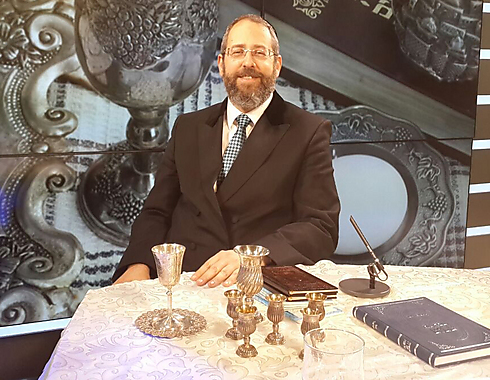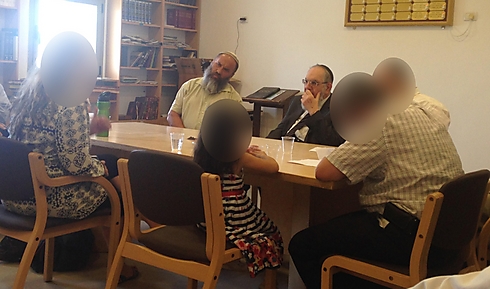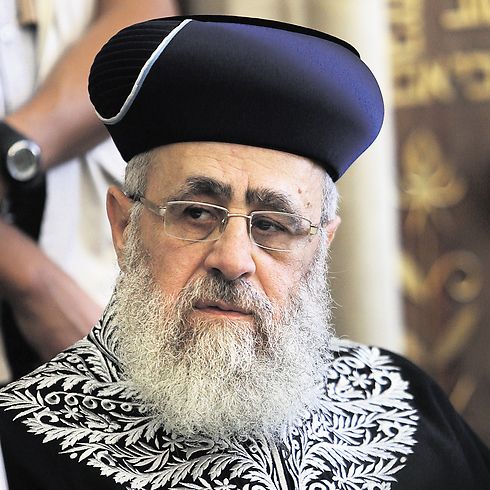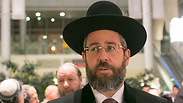
'Rabbinate's conversions are accepted by everyone, Reform conversions are not'
Two years after taking office as Israel's chief Ashkenazi rabbi, Rabbi David Lau explains why Law of Return should be changed, stands by his condemnation of 'price tag' activities against Palestinians and religious Christian institutions and admits there is no need for two chief rabbis in Israel.
It wouldn’t be an exaggeration to say that it is the most hated institution in Israel, fighting on several fronts at the same time: The kashrut issue, the new conversion courts announced by the Tzohar organization, and mainly the rabbinical courts, which provide a variety of horrific stories on an almost weekly basis.

"Let's assume that my neighbor in Modiin is the New York City engineer, and I build a balcony in my home under his supervision and approval," Rabbi Lau demonstrates his view on the conversion courts issue. "Will Mayor Haim Bibas avoid issuing a demolition order because my neighbor is a chief engineer in New York? Of course he won't, and rightfully so. There is a municipality, there is an engineering department, and it's their responsibility. We can't have each person making his own decisions."
So let me give you a different example. Let's assume I have a friend, the best doctor in Israel specializing in a certain medical problem, and he recommends a treatment for me although he doesn’t work for my HMO. Do you think my family doctor will dare not accept his recommendation?
"I'm not sure. Maybe he will and maybe he won't. It's the HMO doctor's consideration. I think that the issue has nothing to do with conversion at all, but with clarifying a person's Jewishness, and that we must also start thinking about changing the Law of Return. Should continue granting immigration rights also to people who only had a Jewish grandfather?
"I believe that the Law of Return, which was suitable for the years when a comparison was made to those persecuted by the Nazis, is not longer suitable now, unless Israel decides to become a welfare state for the entire world."
Why does the State even have to deal with conversion?
"If divorce and marriage are performed by the State, conversion should be performed by the State too. The Rabbinate must be the address."
What about Reform Jews? What is the State of Israel and Orthodox establishment's problem with them?
"Those who were born Jews are definitely Jews, but the question is not who is Jewish but who is authorized to add more Jews to the people of Israel. I would like to have a safety factor: Whoever is deemed completely Jewish by the Rabbinate is accepted by everyone. If a person is converted by a Reform panel, he will not be accepted by everyone here, so let's go for the version which everyone will accept."

And why does the State have to deal with or intervene in kashrut issues?
"The Rabbinate's kashrut is aimed at providing uniformity and allowing places in the periphery to receive a kosher authorization as well under the same conditions. I have to make sure that there are supervisors everywhere, just like there are medical services everywhere."
So open up the market. Why does the alternative kashrut bother you?
"Because it's deception. People see the word 'kosher,' see a picture of a great rabbi and think that's enough, but according to the Halacha (Jewish Law) it's not enough."
The situation today allows kashrut supervisors to extort businesses, and I have already encountered such cases.
"Look, I can work, ensure transparency, carry out reforms and revolutions, create competition, and suddenly some mischief maker, one supervisor, comes along and destroys everything. I'm begging you, if anyone knows such people – file a complaint with the police. I guarantee that your kashrut certificate will not be revoked."
'Rabbinical courts do have a bad reputation sometimes'
He is 49 years old, the second generation of a rabbinical dynasty, the son of former Chief Rabbi Israel Meir Lau. On the wall next to his chair hang the pictures of the two chief rabbis in the footsteps of whom he wishes to follow: Rabbi Avraham Yitzchak Hacohen (Rav Kook) and Rabbi Isaac Halevi Herzog, the father of former President Haim Herzog and grandfather of Labor Party Chairman Isaac (Buji) Herzog.
On the other side of the wall sits Chief Sephardic Rabbi Yitzhak Yosef, known as the Rishon LeZion. "We both have our hands full of work," Lau says. "And there are anyway two of us, so why not cater to the needs of each denomination?"
In other words, you admit that there is no real need for two chief rabbis?
"That's true, but there are already two and the division of work between them is to the point: The Rishon LeZion is responsible for the courts and conversion, and I am responsible for kashrut and marriage."
Rabbi Lau appears uncomfortable with Rabbi Yosef's area of responsibility. He stresses, time and again, that Rabbi Yosef is the Supreme Rabbinical Court president, not him, but he doesn’t deny the problems.

This week, for example, the Selection Committee for Rabbinical Judges is scheduled to convene to elect 24 new religious judges for the district courts and seven for the Supreme Rabbinical Court. One of the leading candidates for a promotion – following a deal struck with Religious Affairs Minister Aryeh Deri, who promised him he would be elected in exchange for his support for Rabbi Yosef in the race for chief Sephardic rabbi - is Rabbi Eliyahu Abergel, head of the district court in Jerusalem, who has been at the center of a number of extremely "puzzling" affairs. His secretary and a wheeler dealer associated with him have been detained and questioned on suspicion of accepting a bribe, and the rabbi himself has met privately and repeatedly, against procedures, with people whose cases he has discussed.
"I don’t know if these complaints about a certain religious judge have reached the Supreme Rabbinical Court president or not. First of all, I suggest that people turn to the Supreme Rabbinical Court president if they have any complaints. I am aware of the fact that the system sometimes has a bad reputation. You are talking about two or three judges who the criticism focuses on, which means that an absolute majority of the judges are doing an excellent job."
Do you find it appropriate to appoint such a person to the Supreme Rabbinical Court?
"I don’t want to talk about a specific person. That's what the 11-member committee is for."
A committee is nice, but there is a deal under which each denomination – Sephardic haredim, Ashkenazi haredim and national-religious – is supposed to receive its own appointments.
"There is no commitment. Is it over? I don’t know. There are discussions, they are talking."
Isn't this a politization of the system? After all, the best judges should be elected, not the ones with more connections.
"The ones who should be elected are the best judges, and there is a variety. The 11 people who have been appointed and represent a broad spectrum should be given some credit. It works the same way in the courts. Sometimes you are forced to reach what is available rather than one is desirable. Let's hope that out of the elected candidates, even if the best three are not appointed, three good ones are appointed."
Another issue is the appointment of 10 "fellow judges," who have already retired. Some of them, like Rabbi Israel Yifrach and Rabbi Avraham Sheinfeld, have delivered shocking, sexist and illogical rulings – and now they will be returning through the back door at the discretion of Rabbi Yosef and his patron, convicted felon Aryeh Deri.
"As a person who shares your concern," Rabbi Lau says, "I suggest that you direct all this information at the 11 committee members."
Rabbi Lau has his own candidate for a promotion, Rabbi Aharon Katz, who sits with him every Tuesday on the Supreme Rabbinical Court panel. This panel is considered particularly successful, and a well known figure in one of the women's organizations told me this week, "I pray to receive this panel every time. They are doing an amazing job."
Rabbi Lau is slightly embarrassed by the compliments, but tries to defend the courts. "With all fairness, we must say that the courts are dealing with impossible conditions," he says. "The number of positions for religious judges has not changed since the State's establishment, remaining at 99, as if the population hasn't grown and as if the number of divorce cases isn't rising constantly. In addition, at the moment, because of the delay in appointments, there is a shortage of 24 judges. The judges are short of many tools and have to deal with property and custody issues, not just with the actual get (divorce)."
Why do the rabbinical courts have to deal with property and custody? That's what the civil courts are for.
"Many times these things have to do with each other. There isn't any other way."
And why do people who get married in a civil marriage have to get divorced in the Rabbinate?
"Upon the State's establishment, it was decided that marriage and divorce are Jewish matters. It's necessary both as a symbol and for the next generation. In order to give your granddaughter a chance to marry my grandson, marriage and divorce must be registered. Under the Halacha, once a link is created between a couple, a divorce must be performed according to Jewish Law. Do you want to create two nations? Five nations?
That's not very democratic.
"Even in a democracy a child is forced to receive a vaccination."
That's a matter of life and death.
"I feel that the concept of the Jewish family is a matter of life and death. Even in a democracy, don't do something which will create a problem for your children, which will lead to separate family trees. I would like us to remain a Jewish state at least in that sense."
In the past few months, I have encountered quite a few cases in which the courts discriminate, consistently, against women and men who have left religion while their partners remain religious. Sometimes, they act against welfare reviews and experts' recommendations. Rabbi Lau seeks to renounce such things too.
"I am bound by one thing under the Halacha – the children come first," he says firmly. "If a child reaches the ER in a state requiring a life-saving procedure, the doctors will ignore the father and mother asking them not to treat him, and will do what they have to do. As far as I am concerned, the same principle should apply to the court. I regularly tell the mother and father: Remember that you have children and that you have to do everything for them to have a father and mother."
'This is not Judaism'
Rabbi Lau has been the subject of quite a lot of criticism from right-wing groups and religious extremists due to this strong condemnation of "price tag" activities, the attacks on churches, the murder at the Jerusalem Pride Parade and the arson attack at the Dawabsheh family's home in the village of Duma. He stands by what he said before, that "this is not Judaism and this is not the way of the Torah."
Isn't there a call in the Torah and in Jewish Halacha to eradicate idolatry?
"Some mitzvot are not directed at the individual, but are public mitzvot only," he says, attempting to divert from the issue."First of all, there is a halachic question and different opinions on the definition of idolatry. Secondly, there is the matter of having a king in Israel. Thirdly, we are nowhere near there."
In other words, in a utopia, in a Halacha state, Christianity should be eradicated, just not now?
"No. We have to see. The Christians may not be so devoted to idolatry today. There are many other questions, and we are nowhere near there."
















